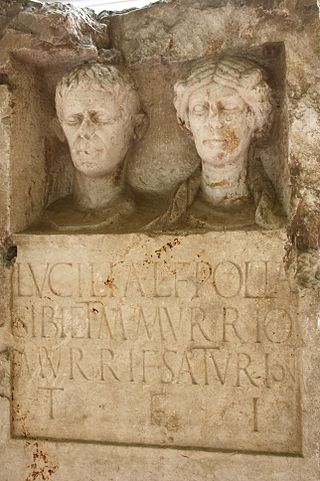Related Research Articles
The gens Gavia, or occasionally Gabia, was a Roman family of plebeian descent. It first appears in history during the first century BC, but none of its members obtained any of the curule magistracies until imperial times. The Gavi Arch at Verona was built in honor of one of the Gavii.

The gens Lucilia was a plebeian family at ancient Rome. The most famous member of this gens was the poet Gaius Lucilius, who flourished during the latter part of the second century BC. Although many Lucilii appear in Roman history, the only one known to have obtained any of the higher offices of the Roman state was Lucilius Longus, consul suffectus in AD 7.

The gens Licinia was a celebrated plebeian family at ancient Rome, which appears from the earliest days of the Republic until imperial times, and which eventually obtained the imperial dignity. The first of the gens to obtain the consulship was Gaius Licinius Calvus Stolo, who, as tribune of the plebs from 376 to 367 BC, prevented the election of any of the annual magistrates, until the patricians acquiesced to the passage of the lex Licinia Sextia, or Licinian Rogations. This law, named for Licinius and his colleague, Lucius Sextius, opened the consulship for the first time to the plebeians. Licinius himself was subsequently elected consul in 364 and 361 BC, and from this time, the Licinii became one of the most illustrious gentes in the Republic.
The gens Afrania was a plebeian family at Rome, which is first mentioned in the second century BC. The first member of this gens to achieve prominence was Gaius Afranius Stellio, who became praetor in 185 BC.
The gens Visellia was a family at ancient Rome during the late Republic and early Empire. Two members of this gens achieved the consulship during the first century.
The gens Cluvia was a plebeian family at ancient Rome, known from the later Republic, and early imperial times. The first member of the gens to achieve prominence was Gaius Cluvius Saxula, praetor in 175 and 173 BC.
The gens Fadia was a plebeian family at Rome. Members of this gens are first mentioned around the time of Cicero, but they did not obtain any of the higher offices of the Roman state under the Republic. Their fortunes improved under the Empire, and two of the Fadii held consulships during the second century.
The gens Egnatia was a plebeian family of equestrian rank at ancient Rome. Only a few of the Egnatii held any magistracies, of whom the most important may have been Gnaeus Egnatius, who held the praetorship during the second century BC, and served as governor of Macedonia, shortly after its institution as a Roman province.
The gens Pilia was an obscure plebeian family at ancient Rome. None of the Pilii attained any of the higher magistracies of the Roman state, and members of this gens are known primarily through the writings of Cicero, who was acquainted with a family of this name; but many others are known from inscriptions.

The gens Plancia was a minor plebeian family of equestrian rank at ancient Rome. Few members of this gens are mentioned in the time of the Republic, but a family of the Plancii rose to prominence from the time of Vespasian, and held a number of important magistracies through the time of Hadrian. Other Plancii are known from inscriptions.
The gens Precia was a minor plebeian family of equestrian rank at ancient Rome. Members of this gens are first mentioned toward the end of the Republic.
The gens Rupilia, occasionally written Rupillia, was a minor plebeian family at ancient Rome. Members of this gens are first mentioned in the latter part of the Republic, and Publius Rupilius obtained the consulship in 132 BC. Few others achieved any prominence, but the name occurs once or twice in the consular fasti under the Empire. The name is frequently confounded with the similar Rutilius.
The gens Sallustia, occasionally written Salustia, was a plebeian family at ancient Rome. Members of this gens are first mentioned in the time of Cicero, and from that time they attained particular distinction as statesmen and writers. The most illustrious of the family was the historian Gaius Sallustius Crispus, who wrote valuable works on the Jugurthine War and the Conspiracy of Catiline, which still exist.
The gens Satria was a minor plebeian family at ancient Rome. Members of this gens are mentioned in the first century BC, and under the early Empire, but none of them rose higher than the rank of praetor. Otherwise the Satrii are known largely from inscriptions.
The gens Scaptia was a minor plebeian family at ancient Rome. Few members of this gens are mentioned in history, but they gave their name to the Scaptian tribe, established in 332 BC.
The gens Seia was a minor plebeian family of equestrian rank at ancient Rome. Members of this gens are first mentioned in the time of Cicero, and a few of them held various magistracies under the late Republic and into imperial times.
The gens Selicia, possibly identical with Silicia, was an obscure plebeian family at ancient Rome. Hardly any members of this gens are mentioned in history, but a number are known from inscriptions.
The gens Servia was a minor plebeian family at ancient Rome. Few members of this gens are mentioned in ancient writers, but a number are known from inscriptions.
The gens Silia was a plebeian family at ancient Rome. Members of this gens are mentioned as early as the fifth century BC, but first to hold the consulship was Publius Silius Nerva, in the time of Augustus. The Silii remained prominent until the time of the Severan dynasty, in the early third century.
The gens Tadia was a minor plebeian family at ancient Rome. Members of this gens are first mentioned in the time of Cicero, but few achieved any great distinction in the Roman state.